How to use ChatGPT to study accounting

CPA PEP coach and mentor Gevorg Grigoryan, CPA, presents five tips for using ChatGPT and other AI resources to study for Canadian accounting exams
VANCOUVER – ChatGPT, OpenAI’s cutting-edge chatbot, has captured worldwide interest with its advanced capability to understand queries and deliver responses that appear human-like. In response, Microsoft and Google have released their own chatbots, Bing Chat and Bard, to challenge ChatGPT’s dominance in the growing field of AI technology. Among the industries most disrupted, education stands out, as it has been reshaped by the use of AI tools, which act as personal tutors and study partners.
Here are five tips (and prompts) that Canadian accounting students can use with ChatGPT to prepare study notes, understanding complex accounting topics, and study for their CPA Canada exams, whether in the Professional Education Program (CPA PEP) or the Common Final Examination (the CFE).
But first: An important note on plagiarism and generative AI
Students are always looking for tools that will give them an advantage in the education program. However, tools are not an easy way to success. Using generative AI tools, such as ChatGPT, to solve assignments and submit as your own work is plagiarism. This is not a grey area. It doesn’t matter if you copy from a friend or a chatbot, if you submit work you didn’t create, that’s plagiarism. CPA Canada has strict rules against cheating and plagiarism; its D2L platform uses plagiarism detection software, such as Turnitin, to detect AI generated content. Beware that generative AI should not be used to solve assignments or fabricate answers, it should be used only for study purposes.
#1: Create flashcards.
ChatGPT can streamline the creation of flashcards to help with your studies. You can choose any accounting subject, ask it to create topics and answers, and even structure it in a columnar format. The results can be exported to Excel and used as digital or physical flashcards. ChatGPT can also adjust the complexity of the content, based on your current level of understanding, making it adaptable to your level of knowledge.
Example prompt:
You are a CPA Canada student studying [Management Accounting].
Generate 10 flashcards on [Management Accounting topics].
Output with topics in the first column and answers in the second column.
Output as a table.
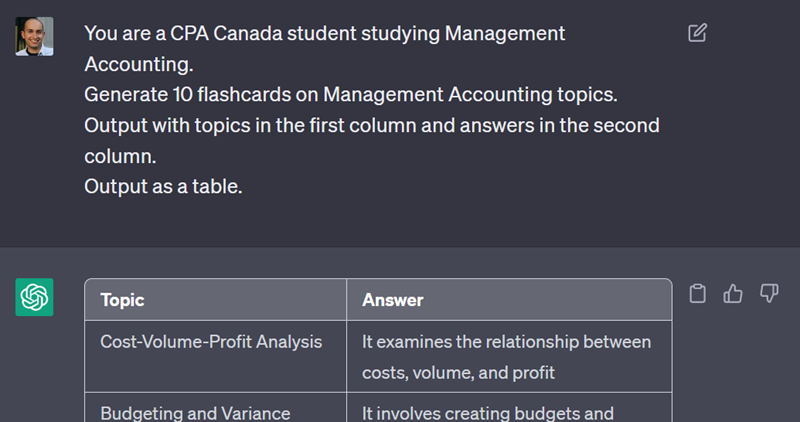 |
CLICK TO ENLARGE. (Courtesy: author.) |
#2: Act as a peer tester.
One of the best ways to check how well you know a subject is to get quizzed on it. This is a form of active-recall study technique, since you're actively trying to remember and use the information. Active recall helps to reinforce learning and identify areas that you need to brush up. We can ask ChatGPT to adopt the persona of a peer tester and quiz us on a topic we’re studying.
Example prompt:
You are my peer tester quizzing me on [Canadian Financial Reporting].
Ask 3 questions on the topic: [IFRS 15]
Begin by asking the first question. Wait for my response before asking next question.
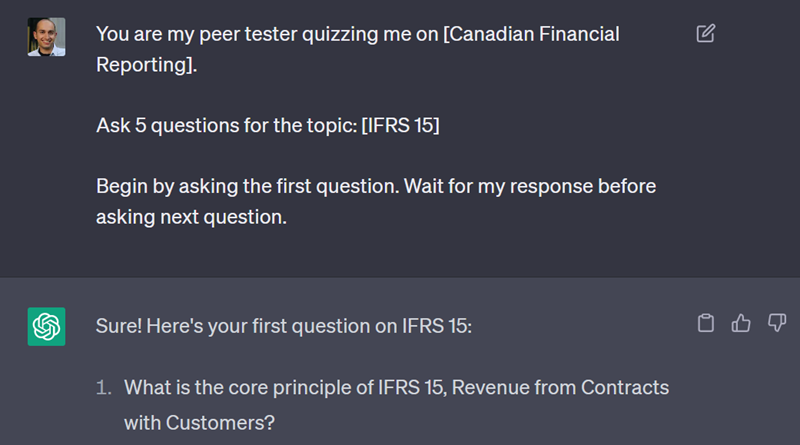 |
CLICK TO ENLARGE. (Courtesy: author.) |
#3: Summarize notes.
CPA Canada’s PEP modules are fast-paced and accounting students find that there is not enough time to review all the materials. The process of reading chapters, making notes, and summarizing your notes takes substantial time. We can ask ChatGPT to summarise our notes and provide us an overall conclusion to speed up our studies. To make the results more effective, we’ll ask it to use bullet points and simpler language.
Example prompt:
Summarize the text below using bullet points and simplified language.
Include an overall summary at the end.
[Paste here]
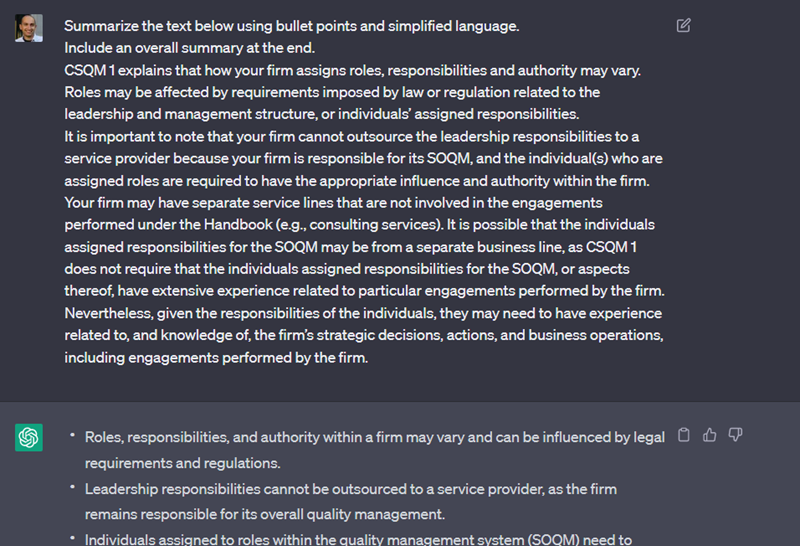 |
CLICK TO ENLARGE. (Courtesy: author.) |
#4: Help to understand solutions.
Getting the final answer may not always be enough to understand how to solve a problem, especially in complex topics, such as Canadian taxation. We can ask ChatGPT for help interpret and simplify answers. Keep in mind that ChatGPT is a language model, not an advanced calculator; it allocates tokens (units of information) to understand and generate text. While ChatGPT can perform basic calculations, its capabilities are limited. I suggest not to use it to for Management Accounting and Finance calculations, as it often gets the answers wrong. Instead, use it for theoretical subjects, such as Financial Reporting, Taxation theory, Strategy & Governance, and Assurance.
Example prompt:
Below is a problem and solution on [Canadian Taxation]
Explain the solution to me step by step in simple language.
[Paste here problem and solution]
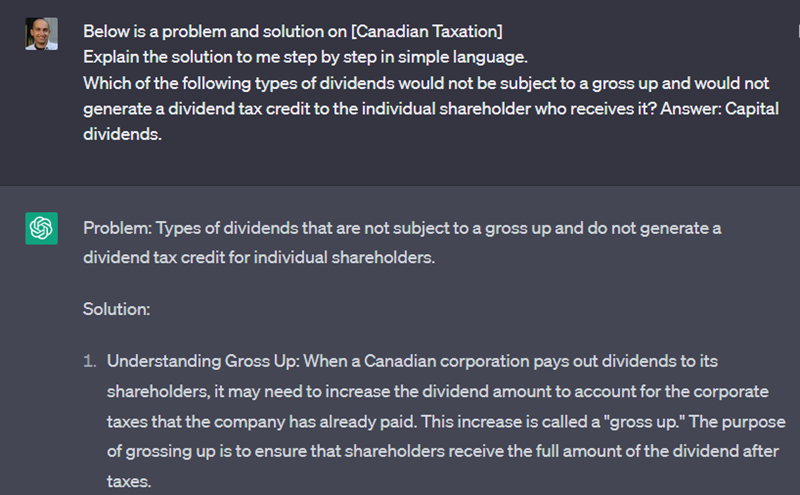 |
CLICK TO ENLARGE. (Courtesy: author.) |
#5: Help to memorize.
Each of us has a favourite artist whose name we recall after just one listen of their song or seeing the lyrics. Using ChatGPT, we can write songs in any artist's style about topics that we find difficult to remember. This can be useful for memorizing complex accounting rules, such as finance formulas, taxation rules, and accounting standards.
Example prompt:
Write a very short song in the style of [The Weeknd] that explains [NPV calculation]
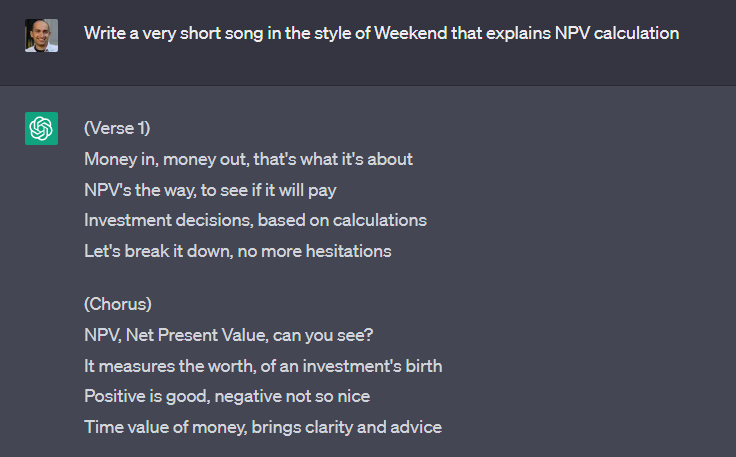 |
CLICK TO ENLARGE. (Courtesy: author.) |
Conclusion
Computer aids were looked upon sceptically by some on the teaching side of the profession decades ago. However, as technology continues to evolve and improve, we will see more ChatGPT and other AI-powered chatbots become part of our personal and professional lives. By staying up-to-date and learning how to use emerging technologies, accounting students can increase their academic performance in CPA Canada’s education program, as well as their skills in the workplace, and thus become more value-added chartered professional accountants.
Gevorg Grigoryan, CPA, is an instructor, mentor and coach to students in the CPA program. Visit Gevorg CPA to learn more and subscribe to Gevorg’s YouTube channel to access CPA program videos.







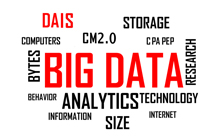


(0) Comments